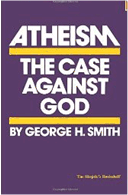

 |  |
Atheism: The Case Against God
|
Please go to the new Coffee Coaster site implemented more gracefully in Wordpress. This page @ http://brianrwright.com/CoffeeCoasterBlog/?p=2334 |
 This book is from a special era, when one of the major issues of the young budding World Libertarian was faith vs. reason, usually represented in belief in a supernatural being or not.[1] As an ideologue and activist in the early American libertarian movement—let's pick a timeframe: I'll say from the publication of Robert Heinlein's The Moon is a Harsh Mistress (1966) to the 1979 Libertarian Party Nominating Convention in Los Angeles, California—I took part in a number of debates on the existence of God. My intellectual foundation was located principally in the works of Ayn Rand, who was an explicit advocate of reason.
This book is from a special era, when one of the major issues of the young budding World Libertarian was faith vs. reason, usually represented in belief in a supernatural being or not.[1] As an ideologue and activist in the early American libertarian movement—let's pick a timeframe: I'll say from the publication of Robert Heinlein's The Moon is a Harsh Mistress (1966) to the 1979 Libertarian Party Nominating Convention in Los Angeles, California—I took part in a number of debates on the existence of God. My intellectual foundation was located principally in the works of Ayn Rand, who was an explicit advocate of reason.
Rand, although an atheist, didn't dwell on making arguments against the various intellectual citadels of faith the various religions, particularly Christian ones, put out to support their concepts of God. As Nathaniel Branden, at one time Rand's designated intellectual heir, put it: Objectivists don't spend a lot of time examining the follies of mystic belief, including the idea of "God." In his words, "The adversary is too unworthy." Which of course you can take in a couple of ways; if you didn't hang with the Randians, you probably thought it a bit high-handed. Still, Branden wrote what I regard as one of the best arguments against the standard concept of God as first cause. I have it as a jpeg, and will post on my site here:
This little gem helped me win a few arguments with the rampant Christian faithniks of that era, though to be fair, when one side advocates reason and the other side advocates faith—which in this context is the acceptance of ideas or allegations in the absence of sensory evidence or rational demonstration—the advocate of reason has a big edge... if people in the audience care about logic. Anyway, I liked the Branden take on causality being in the universe, not the universe being in causality, and one thing led to another. I was always a reader, and theism fascinated me. The following two books were key:
Many other books in a philosophical vein, but fundamentally I was trying to make a buck in the real world and see whether the Libertarian Party could be made successful. So the majority of my reading was political. On the simple humanistic side, I did encounter one of the most remarkably benevolent and helpful children's books on supernatural beings... from a soft-spoken fellow who was a major alternative thinker hanging around Michigan libertarian circles back in the day: What about Gods?, Chris Brockman. I'm delighted to see Amazon carries it and it continues to draw interest. Chris, here's to you, man!
The humanistic approach later became far more important to me, but in the 1970s and 1980s, I was still focused on the intellectual case. I had heard of George Smith's book, and was told it was the last word on the subject, that he had completely nailed all aspects of the argument. I recall hearing of Mr. Smith on the periphery of the libertarian movement, something of a freethinking Objectivist and a philosophical anarchist. He was adamant that libertarians of integrity not work for the state, including state universities; and he seems to have lived it. Kudos. Unfortunately, I had not read Atheism: The Case against God until recently.
In a word Atheism is a great book. In the beginning, Smith takes methodical to new heights, as if setting out to perform a complex surgery—or play a chess match with a Grandmaster—and not wanting to leave any possible line of attack unprepared. You get that sense from the opening of Chapter 2: The Concept of God:
Knowing what one is talking about is of inestimable value in any dialogue, so the theist, before he sets out to explain why we should believe in god, must first explain what he means by the word "god." What is the theist attempting to establish the existence of? What is the nature of god? How are we to identify him (or it)? At least some of the attributes of this supposed creature must be known before anything can be considered relevant to establishing his existence. As one theist puts it, "With no description or definition to work from, we will literally fail to know what we are talking about." — Page 29
Smith deals with all the standard objections to God's existence from reconciling omniscience with omnipotence (if God knows something will happen can he make something else happen?) to the problem of evil (if God is good and omnipotent, how does evil come into the world?). And unlike most texts on the subject, he explores every phrasing and nuance of the contentions. He notes all the various ploys theists have taken to have their cake and eat it, too, and carefully demolishes each pretense.
Epistemological transcendence is perhaps the only common denominator among all usages of the term "god" including those of Tillich, Robinson, and other modern theologians. While some theists reject the notion of a supernatural being... it seems that every theist agrees that a god is ... "unknowable." — Page 39
Which, of course, concedes way too much ground to the opposition. If what you propose is unknowable, then you don't have much confidence in its existence. Plus how do you demonstrate what is unknowable? And yes the remainder of the book, especially the first 100 pages deals with the intellectual logic. After that, Smith takes the gloves off and expresses a well-deserved moral outrage against those who turn a blind eye toward the immense suffering faith has inflicted, and continues to inflict, on all sentient beings:
The bloodstained history of Christianity is a dramatic testimony to the conflict between reason and faith, and it illustrates that many Christians, especially those in power, have themselves been aware of the deadly threat that reason poses to faith. — Page 114
One of a kind book, that will make you feel good about being a person of reason, on the way to true spiritual awakening.
[1] The other major dividing line among early American self-described libertarians—for those old enough to remember—was "limited government vs. anarchy."
###
2011 December 07
Copyright © Brian Wright | The Coffee Coaster™
Case Against God | George H. Smith | Atheism vs. Theism | 1970s
 |
||||